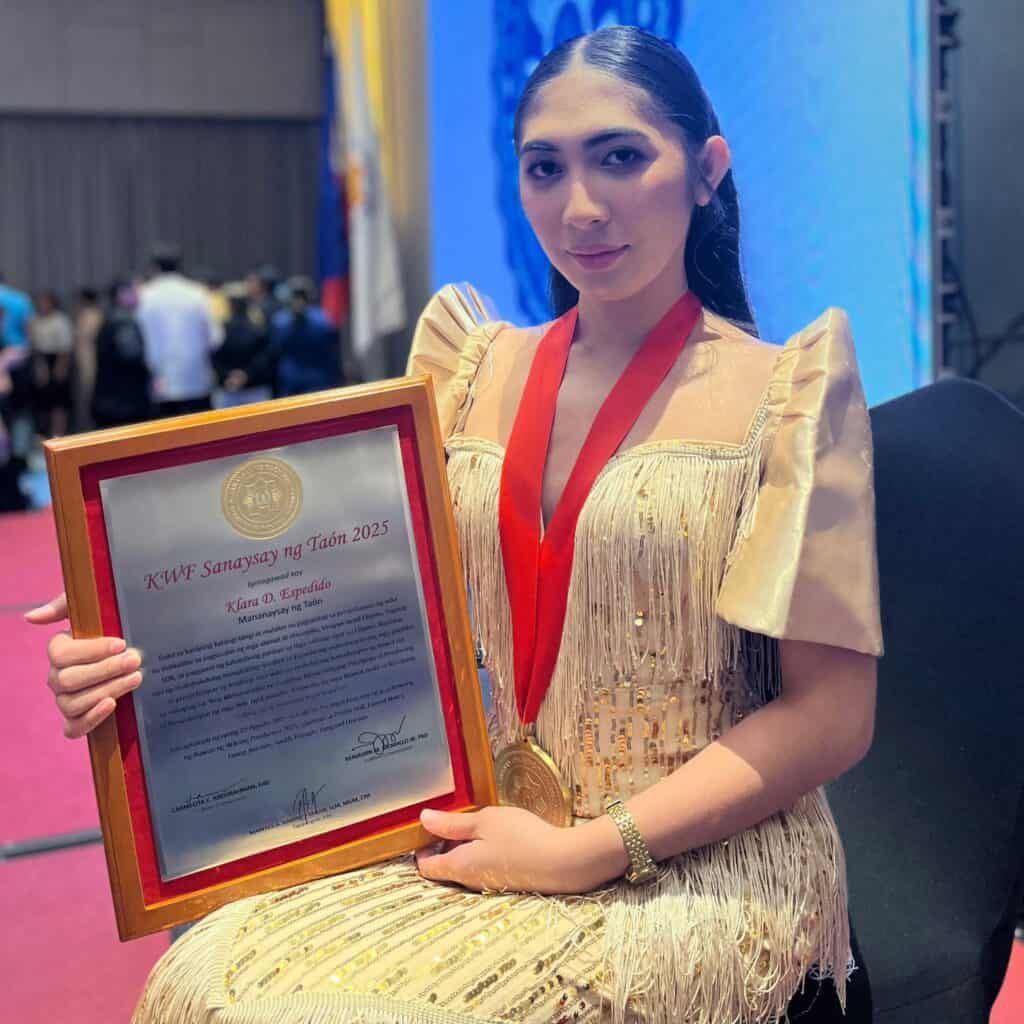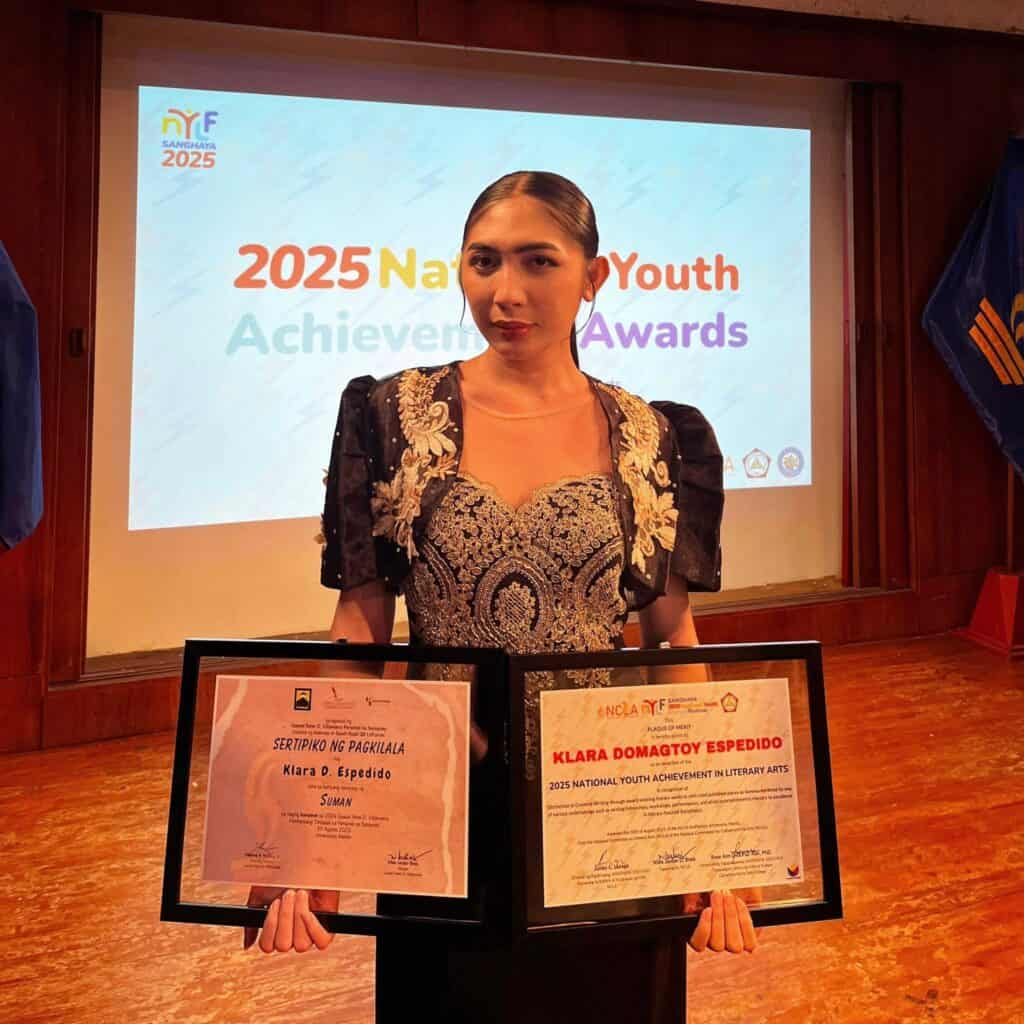LEGAZPI CITY—Writing an essay on the protection of indigenous languages in the Philippines, a transwoman from Bulusan town in Sorsogon, was hailed by the Komisyon ng Wikang Filipino (KWF) as the essayist of the year on Aug. 19.
Klara Domagtoy Espedido, 20, wrote an essay on how metanarratives of transgression (or breaking of norms) are used as basis and hope for preserving indigenous languages in the Philippines. Her title Mananaysay ng Taon 2025 came with a P30,000 cash prize.
The Gawad KWF sa Sanaysay is an annual award given by KWF for the best essay tackling relevant and timely themes. Through this competition, Filipino is showcased as a language of scholarship and research.
Espedido said that she dedicates her essay, titled, “Ang Metanaratibo ng Paglabag Bilang Saligang Paretyeya at Penahrang sa Preserbasyon ng mga Wikang Katutubò: Pahiwatig ng mga Alamat mulâ sa Bersiyong Saliling ng Bendingang Kapu’unpu’un,” to the Livunganen-Arumanen Manobo people in Mindanao.
“Kasabay nito ay ang aking panawagang protektahan ang ating mga katutubong pangkat kasabay ng preserbasyon ng mga wikang katutubo (Along with this is my call to protect our indigenous groups together with the preservation of our native languages),” she said.
The essayist also shared on a social media post her call to enrich indigenous languages, which she said are important for national identity and liberation.
“Nananawagan din ako, higit lalo, sa mga katutubo at Moro, sa kababaihan (biolohikal man o transgender), at sa kabataan: makiisa tayo sa pagpapaunlad ng mga wikang katutubo sapagkat kinakailangan ang ating tinig para sa pambansang pagkakakilanlan at pagpapalaya,” according to the post.
(I also appeal, especially to the indigenous peoples and the Moro community, to women, whether biological or transgender, and to the youth: let us unite in advancing our native languages because our voices are essential for national identity and liberation.)
She added that there are still “so much to be fixed, cultivated, and strived for” in keeping these languages alive.
According to the language database Ethnologue, there are 175 living indigenous languages in the Philippines. 59 of these, however, are “endangered.” Ethnologue classifies languages that are not learned and used by children as “endangered languages.” Two languages in the Philippines have been classified as “extinct.“


Journey as writer
Aside from Mananaysay ng Taon 2025, Espedido also received two other awards this year: the 2025 Gawad Bienvenido Lumbera grand winner for Bikol short story and the 2025 National Youth Achievement Award in Literary Arts.
Espedido began writing at a young age. Her love for reading books pushed her to pursue writing.
It was during her third grade when she first attempted to write her version of the legend of the lanzones fruit.
“[That joy for writing] came from the reading materials that I used to ask my mother to buy for me—the cheap ones. I was very fond of reading those kinds of booklets that contained short stories, legends, riddles, and more,” she said.
Her writings focus on children’s literature, queer literature, and regional literature.
Her identity as a transwoman from the southernmost tip of the Bicol peninsula also shapes Espedido’s work.
“The intersectionality of my work as a transwoman from Sorsogon surfaces in my work. I strive to include my advocacies for gender equality and personal issues that cannot be separated from the policital,” she said.
Aside from using Filipino in her work, she uses Bikol-Sorsogon, her mother tongue, in her work that includes poems intended for kids.
Not silent
Espedido’s writing is not a form of silent protest—it is loud, it speaks. She writes because she has something to assert, whether it is the existence of trans people, the rights of national minorities, or the essence of the advocacies she believes in. For her, writing is a form of active participation in calling out social issues through the power of pen and paper.
For her, this win is symbolic and monumental.
She said that it was not just her win, but an entire community’s.
“This is a victory for every transwoman who fights,” Espedido said. “Throughout the history [of this prize], if I am not mistaken, I am the first transwoman to win Mananaysay ng Taon. I don’t want to claim it, but I must. In a society that still sees us as lesser than cis individuals, it is important to record data and create history.”
A cisgender is an individual whose gender identity aligns with their sex at birth.
Although she is now recognized as an essayist and has received accolades for her works, she still wants to explore other forms of literature.
Pageant experience
Of all her previous essays, Espedido said that the one closest to her heart is “Si Miss Packaging Tape at ang Mundo ng Ladies and Gentlemen.”
This essay, she said, encapsulates her entire life including, and especially, her experience as a pageant candidate.
For her fellow LGBT community members, she has one message:
“Let us continue what those before us have started. Let us keep reclaiming spaces. Let us take part in building a just and compassionate society. If possible, join national-democratic organizations to further deepen our understanding of society. Being a transwoman is part of who we are. The challenge for us is how we break free from stereotypes and boxes. Step by step, let’s keep moving forward,” she said. | Michael Josh Toledo and Jay-r Nabor (raro)
Photos: Klara Espedido
